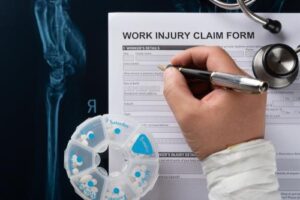
Flying an aircraft requires unique skills, knowledge, and experience. In the busy aviation hub of Atlanta, pilots are responsible for safely transporting countless passengers and cargo daily. Unfortunately, the job comes with inherent risks, and accidents or injuries can occur. When they do, pilots need to be aware of their rights and the workers’ compensation claims process by speaking with an attorney from John Foy & Associates.
The life of a pilot in Atlanta is fraught with responsibility, and workplace injuries can be complex. If you’re a pilot who has been injured on the job, it’s essential to seek the guidance of a knowledgeable Atlanta workers’ compensation lawyer who understands the intricacies of aviation-related claims.
Workers’ Compensation for Pilots
Workers’ compensation is a crucial form of insurance designed to benefit employees who experience work-related injuries or illnesses. This mandatory coverage applies to most employers in Georgia, encompassing airlines and other companies within the aviation industry. The primary goal of the workers’ compensation system is to ensure that injured employees receive essential medical care and financial support while they recover.
One of the key features of workers’ compensation is its ability to provide wage replacement for employees during their recovery period. This ensures that individuals are not left financially vulnerable when they cannot work due to injuries. Additionally, workers’ compensation aims to alleviate some of the burdens associated with the legal process, as employees are not required to file a lawsuit against their employers to obtain these benefits.
In some cases, workers’ compensation may also offer vocational rehabilitation for injured employees. This support is particularly valuable when individuals cannot return to their previous jobs due to injuries. It provides them with the necessary resources and training to transition into new careers. Workers’ compensation is a vital safety net for employees, particularly those in high-risk industries such as aviation.
At John Foy & Associates, we stand with Atlanta’s aviation professionals. Our experienced Atlanta personal injury lawyers are equipped to navigate the complex nature of aviation workers’ compensation claims, ensuring that injured pilots receive the representation and support they need.
Get the strong arm
Eligibility Requirements for Workers’ Compensation
Pilots must fulfill certain eligibility criteria to qualify for workers’ compensation benefits. One of the primary requirements is their employment status at the time of the injury. They must be actively employed by the airline or aviation company, ensuring that their claim is directly tied to their workplace and the responsibilities that come with it.
This criterion establishes a clear connection between the employee and the company, making the latter accountable for providing the necessary support and compensation. Another crucial factor for eligibility is the nature of the injury or illness itself. It must be directly related to the pilot’s duties and occur during employment.
Pilots can ensure that their claims are valid and entitled to workers’ compensation benefits by demonstrating a direct link between the injury and the job role. This requirement is in place to prevent fraudulent claims and guarantee that only genuine work-related injuries receive compensation.
Timely Reporting
Lastly, pilots must adhere to the timely reporting requirement of Georgia law. They are required to report the injury to their employer within 30 days of the incident. This time frame ensures that both the employer and the injured employee clearly understand the circumstances surrounding the injury and can act accordingly.
Timely reporting is essential, as it allows for a swift and efficient resolution of claims.
Types of Injuries Covered
Workers’ compensation covers a wide range of injuries and illnesses that pilots may encounter in their line of work. These can be categorized into three main groups: traumatic injuries, cumulative trauma, and occupational illnesses.
Traumatic Injuries
These are sudden, acute injuries caused by a single event or accident. In aviation, pilots may experience traumatic injuries during various phases of flight, such as takeoff, landing, or turbulence. Examples of traumatic injuries include fractures, dislocations, sprains, and concussions.
Additionally, pilots may suffer from slip-and-fall accidents on wet or uneven surfaces in the cockpit or other aircraft areas. Traumatic injuries can be severe and require immediate medical attention, potentially affecting a pilot’s ability to continue flying.
Cumulative Trauma
Unlike traumatic injuries, cumulative trauma injuries develop gradually over time due to repetitive stress or strain on the body. Pilots, like other professionals, may experience these injuries due to their work environment or the nature of their job duties. For instance, carpal tunnel syndrome may arise from repetitive hand or wrist movements, while back injuries can result from prolonged sitting in the cockpit. Another example is hearing loss, which can be caused by prolonged exposure to loud engine noise and other sources of high-decibel sounds. Cumulative trauma injuries can significantly impact a pilot’s long-term health and ability to work, making prevention and early intervention crucial.
Occupational Illnesses
These conditions arise from exposure to hazardous substances or environments in the workplace. In the aviation industry, pilots may be exposed to various risks, such as poor cabin air quality, which can lead to respiratory issues like asthma or bronchitis.
Exposure to toxic chemicals, such as those used for cleaning or maintenance, can also result in occupational illnesses. Furthermore, pilots can experience other health-related issues due to prolonged exposure to high altitudes, cosmic radiation, or circadian rhythm disruption from irregular work schedules. Occupational illnesses can have a long-lasting impact on a pilot’s overall health and well-being, making it essential to identify and mitigate potential hazards in the work environment.
By understanding the various types of injuries and illnesses covered by workers’ compensation, pilots can better advocate for their health and safety in the workplace. Additionally, recognizing the warning signs of these conditions can help pilots seek timely medical intervention and support, ultimately reducing the risk of long-term complications and ensuring a safer, healthier work environment.
Seeking Legal Representation
Navigating the workers’ compensation system can be complex, especially for pilots, who may face unique challenges due to the nature of their profession. It’s essential to consider consulting with an experienced Atlanta workers’ compensation attorney to ensure your rights are protected and you receive the benefits you deserve. An attorney can help with the following:
- Filing the Claim: A workers’ compensation lawyer can guide you through filing, ensuring all necessary forms and documentation are submitted correctly and on time.
- Appealing Denied Claims: If your claim is denied, an attorney can help you appeal the decision and represent you at hearings before the Georgia State Board of Workers’ Compensation.
- Negotiating Settlements: In some cases, settling your workers’ compensation claim may be in your best interest. An experienced attorney can negotiate with the insurance company to secure a fair settlement on your behalf.
Contact John Foy & Associates for a Workers’ Compensation Lawyer
Seeking legal representation from a workers’ compensation lawyer at John Foy & Associates can ensure you receive the benefits you are entitled to and navigate the often-complex workers’ compensation system more effectively. Contact us today.
404-400-4000 or complete a Free Case Evaluation form




